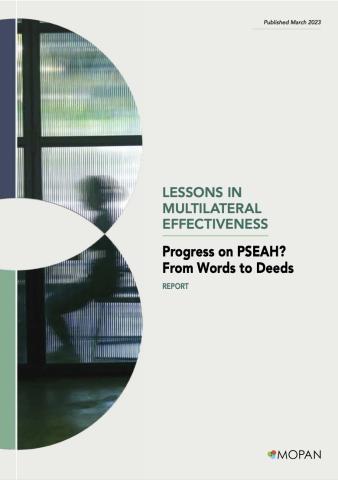
Lessons in Multilateral Effectiveness: Progress on PSEAH? From Words to Deeds.

Combatting SEAH in the multilateral system
Sexual misconduct undermines the core values of the multilateral system. In response, combatting sexual exploitation and abuse (SEA) and sexual harassment (SH) has become a priority for multilateral donors--and the organisations they fund.
Since 2019, MOPAN has been expanding work and developing benchmarks on the protection from SEA and SH (PSEAH) integrating new key performance areas into its methodology and creating the first SEAH Note for Practitioners. Work on PSEAH has matured since then, with a stronger focus on assessing organisation’s efforts in PSEAH, updating the benchmarks, and tracking progress and gaps.
Progress on SEAH? From words to deeds
MOPAN’s most recent analysis of six UN organisations assessed in 2020-22 shows that it is time to move from words to deeds. Organisations have policies and action plans in place, along with training. Mechanisms, structures and capacity to protect from SEA and SH abuses vary greatly between agencies. What organisations lack, however, is reliable resources to fund these efforts, consistent inter-agency collaboration at HQ and in the field, and crucially, consistent tracking of their progress against their PSEAH policies.
As organisations mature, and their efforts in protecting from sexual misconduct evolve, performance standards—for the prevention of sexual exploitation, abuse and harassment—must continually evolve with them. Keeping its benchmarks up to date and improving them over time is one of MOPAN’s commitments.
Read the brief and the synthesis report here.